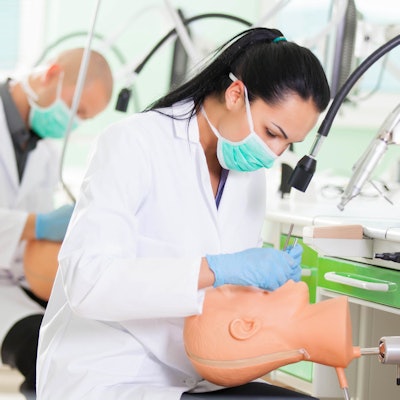
Witnessing rude behavior while feeling burned out may affect the mechanical skills of dental students, resulting in critical errors, according to a study published on June 6 in the Journal of Dental Education.
Uncivil behavior of authority figures, including faculty, is a major factor that can lead to psychological distress and impede learning in dentistry and other health professions. To combat this, dental schools should dedicate extra resources to prevent these behaviors and foster a supportive environment of student learning, the authors wrote.
"Overall, the findings indicate that for those dental students suffering from cognitive depletion, merely witnessing rudeness can have adverse impacts on psychomotor performance and potentially, eventual patient care," wrote the group, led by Andrew Woolum, PhD, of the Cameron School of Business at the University of North Carolina Wilmington.
In workplaces and organizations including dental practices and dental schools, disrespectful behaviors are pervasive. Past research has shown that 98% of workers reported experiencing rudeness at work, and about 50% dealt with this type of behavior on a weekly basis.
Though it has long been suggested that experiencing or witnessing disrespectful behavior affects cognitive performance, research had not previously explored how exposure to rudeness affects the psychomotor skills that are essential to clinical dentistry, according to the authors.
To better understand the effects, 71 second-year dental students at the University of Florida College of Dentistry were enrolled in the randomized controlled study.
At the beginning of the experiment, the students were asked questions about their cognitive depletion, including whether they felt drained and unfocused and thought their willpower was gone. Then, the researchers had 40 students witness a lab manager interact rudely with a prospective lab assistant, whereas the other 31 students observed a neutral interaction between the parties.
After that, all students participated in a mock psychomotor exam for a fixed prosthodontics II preclinical course, which aims to help students develop the didactic and psychomotor skills needed to practice dentistry. The exam required students to perform posterior bridge preparations, according to the authors.
Students who were cognitively depleted and witnessed the rude interaction were significantly more likely to make critical errors when preparing a posterior bridge. The students who felt highly drained and observed the rude event made about 3.5 critical dental errors, while those who felt very depleted and witnessed a neutral encounter made approximately two errors, the authors wrote.
Limitations of the study included that fact that it focused on dental students. Because these students recently learned how to perform prosthodontic procedures and are still building up routines, they may be more at risk of rudeness affecting their performance, Woolum and colleagues wrote.
Dentists and dental schools should understand that it is important to provide a supportive learning and working environment by promoting a culture of courtesy and establishing greater personal accountability for those who behave rudely, they concluded.
"Rude events such as the one described above have the potential to severely affect patient care, especially when dental students or professionals are also depleted," they wrote.




















